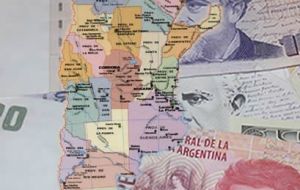MercoPress. South Atlantic News Agency
Argentina confident SEC observations will not hamper debt swap proposal
 President Cristina Kirchner administration running short of cash
President Cristina Kirchner administration running short of cash The United States Security and Exchange Commission sent its response on the Argentine debt swap proposal back to the Treasury Palace. According to sources, the agency has made 15 observations.
“The remarks are included in the ordinary check-out procedure, they were expected” Argentine Economy ministry sources assured in Buenos Aires.
The same sources added that officials from the Economy Ministry are already working towards the final arrangements. The Treasury Palace pointed out that 15 observations were made on a 200-page document, which they described as a “piece of cake work” to be done.“
It was said that next week a new response of the Treasury Palace will be sent. ”Surely, next week we will be sending our replies; the schedule for the new proposal of debt swap will not suffer any changes. Each and one of the 15 observations are very simple to correct“ official sources expressed.
The so-mentioned observations are said to be linked to questioning official statistics. But an Argentine Economy official explained: ”This is a standard procedure. The swap is not to be stopped.”
Officials have said the SEC paperwork was the last hurdle to launching a debt exchange of 20 billion US dollars in defaulted debt planned to open later this month or early February.
However private analysts were not so optimistic about SEC observations. Apparently the observations also include queries about the so called Bicentennial Fund, the current situation of Central bank president Martin Redrado, which the government of Mrs. Cristina Kirchner is trying to sack and the official statistics.
Argentina is hoping the swap will clear the way for it to return to international capital markets for the first time since the massive 2002 default. President Cristina Kirchner wants to issue new debt to ease tight financing this year as the country confronts new 13 billion USD in debt payments.
Argentina halted payments in 2002 on some 100 billion in debt in the biggest sovereign default in history. Three years later, the government forced investors to take steep losses in a debt exchange.
But holders of some 20 billion USD in defaulted bonds did not agree to the 2005 restructuring, and some of the so-called holdouts sued, trying to recover the face value of the paper
On Friday Argentina’s National Institute of Statistics and Census, Indec, reported that the inflation in 2009 grew 7.7%, and retail prices increase was 0.9% in December.
Wholesale prices gained 1% during December compared to the volume reported in October, and increased 10% in 2009. Construction costs grew 0.3% last month and closed with an increase of 10.8% for the twelve months of 2009.
However private agencies had previously reported that the inflation volume for 2009 had reached to 20%.
Indec also reported that the Argentine economy grew 2.2% during November compared to same month in 2008..The Economic Activity Monthly Estimator (EMAE) registered during November a 0.5% increase compared to the volume reported in October. According to Indec, the Argentine economy accumulated a 0.8% increase in 2009.




Top Comments
Disclaimer & comment rulesCommenting for this story is now closed.
If you have a Facebook account, become a fan and comment on our Facebook Page!